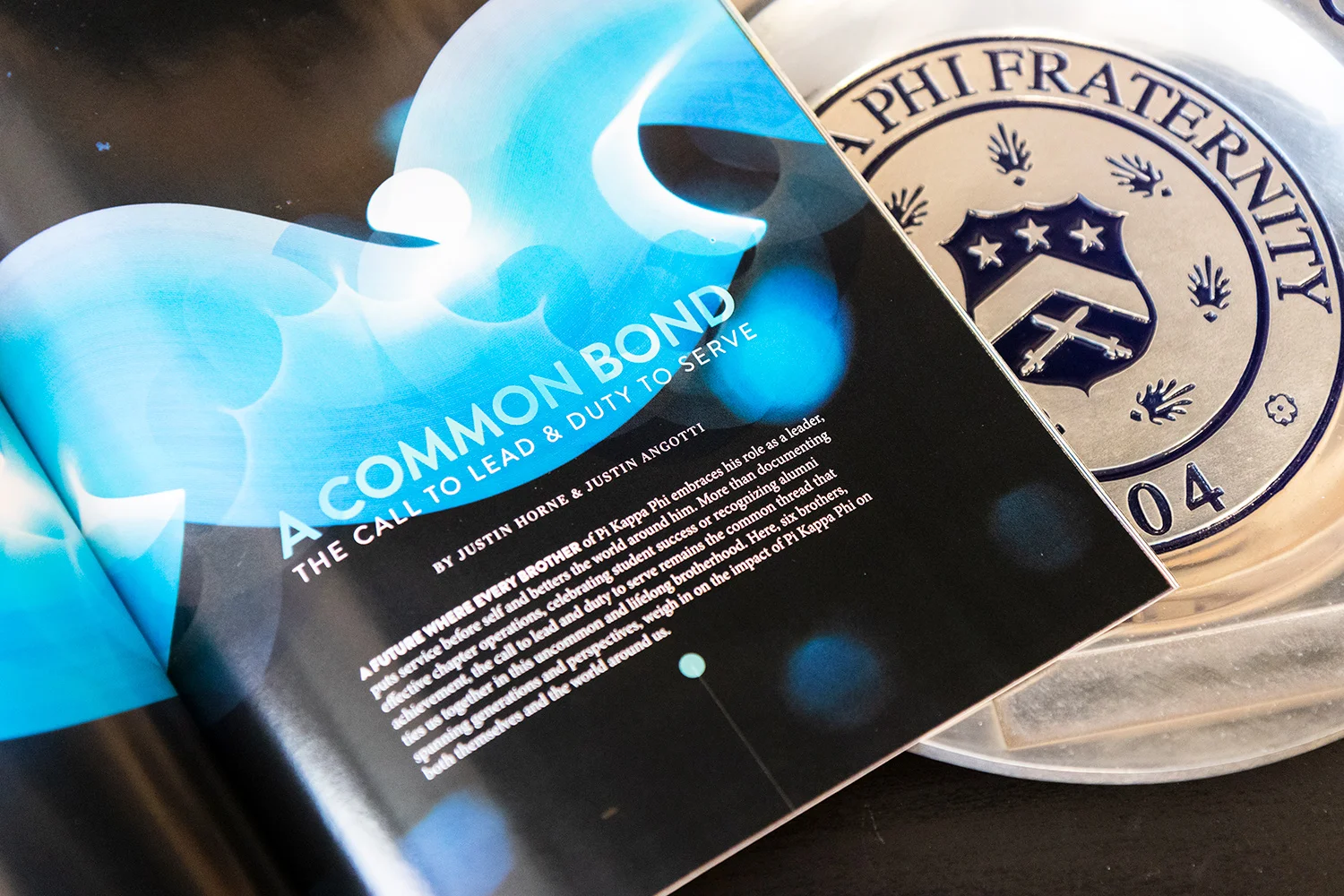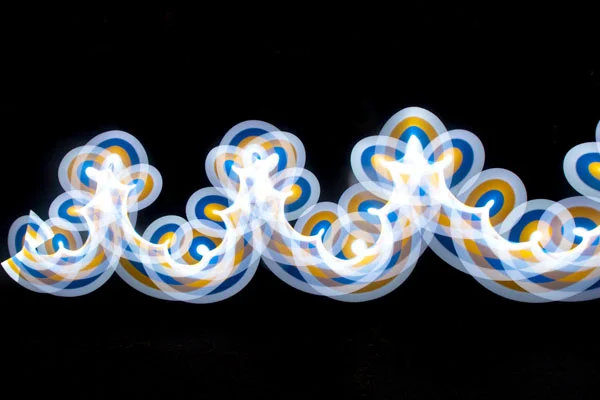A Common Bond
The Call to Lead & Duty To Serve
Role: Interviewing, writing, art direction, light painting with partner.
A COMMON BOND: THE CALL TO LEAD & DUTY TO SERVE
A future where every brother of Pi Kappa Phi embraces his role as a leader, puts service before self and betters the world around him—more than documenting effective chapter operations, celebrating student success or recognizing alumni achievement, the call to lead and duty to serve remains the common bond that ties us together in this uncommon and lifelong brotherhood. Here, six brothers, spanning generations and perspectives, weigh in on the impact of Pi Kappa Phi on both themselves and the world around us.
What does it mean to lead?
Leadership is about more than title or position. Instead, it is a potential that can be developed in all members. Leaders exhibit self-awareness, exemplify character in thought and action, foster collaborative relationships and strive to create positive social change to build a better world for themselves and others.
According to 2016 Thirty Under 30 recipient Alex Thomas, Eta Upsilon (Miami - OH), leadership is about more than just handling day-to-day responsibilities—it is about the future.
During his time at Miami University, Thomas served as Archon, an opportunity he still considers to be an unexpected and invaluable crash course on effective leadership that impacted how he approaches his work today.
“It was never about me as Archon; it was always about us,” Thomas says. “I knew that it was going to take all of us to make the chapter successful.”
After graduating in 2014, Thomas successfully managed a statewide political campaign and then went on to work in the Ohio House of Representatives before becoming Governor John Kasich’s personal aide and eventually his special assistant for legislative affairs.
"A good leader is able to motivate and convince people to do the thing they would not naturally do, for the betterment of the organization as a whole,” says Thomas. “It’s easy to fall into a pattern of mediocrity. A good leader is able to motivate people to be better.”
What can we learn from those moments when our leadership is tested most?
Values determine our priorities and help us decide how we lead and where we go. As brothers of Pi Kappa Phi, our fraternal values are as important to leadership as our personal values.
On the night of our initiation into this brotherhood, we learn, in the words of our founders, the principles and ideals upon which Pi Kappa Phi was built more than a century ago. We are called, through our Ritual, to strive each day to live by these founding principles and work perpetually for the betterment of our fraternity. More importantly is how we publicly express our values and how we lead in times when our values are tested the most.
More than 50 years after his initiation into Pi Kappa Phi, College of Charleston President Glenn McConnell, Alpha (College of Charleston), still talks about the importance of that ceremony on his own decision-making.
“The Ritual is about doing the right thing in moments of crisis,” said McConnell.
Before taking the helm of the College in 2014, McConnell served a long career in the South Carolina Senate.
Amid rumors that the lieutenant governor would resign as a result of ethics violations, McConnell faced a choice: step down from his position as president pro tempore of the South Carolina Senate, in turn protecting his seniority and power, and avoid ascending to a position perceived as largely ceremonial and powerless, or fulfill the constitutional obligation of his position and honor the oath he swore when he was elected and assume the role of lieutenant governor.
On March 12, 2012, after 31 years in the state Senate, McConnell became lieutenant governor.
Thinking back on that day, McConnell shared: “I sat in that office and looked around and said, ‘Why me?’ The fraternity, however, taught me about loyalty, about citizenship, about ideals, about honesty and truth—all the different qualities of what make a person successful in life.”
Two years later, the Board of Trustees at his alma mater named McConnell the College’s 22nd president.
“The moral of the story is this: do the right thing and somehow it will work out,” he says.
What makes a leader exceptional?
Of course, not all advice and lessons take decades to materialize. For Student Representative to the National Council Noah Hendel, Theta Lambda (Missouri State), one of the most influential brothers he’s met joined the chapter right alongside him.
"The greatest thing I learned from him was the ‘lead by example’ mentality,” says Hendel. During a contentious Interfraternity Council (IFC) election, Hendel’s chapter brother withdrew his nomination, publicly citing ethical concerns with the way other candidates approached the election process. His goal? Spark a broader conversation on campus about how the IFC should operate, even if doing so meant losing out at the chance to serve in the council.
“From that, I learned to not just go through the motions,” Hendel says. “Stand up for what you think is right and set an example for people, even outside of your fraternity.”
As Archon, Hendel used this same approach to inspire his chapter to become more involved in service and philanthropy. “There was no better way to encourage my chapter brothers to get more involved with The Ability Experience than to do that on my own, so I applied to be a crew member for Journey of Hope,” he says. “I wanted to lead by example.”
Why is service, not just philanthropy, so important?
True service creates a unique opportunity to foster relationships, develop as a leader, discover your passion and understand new perspectives. These shared experiences are the cornerstone of our work with people with disabilities through The Ability Experience. They are our opportunity to not only better the world around us but to also better ourselves.
Frank Wrenn, Mu (Duke), spends his day as a corporate development officer at Habitat for Humanity, a global nonprofit housing organization with a vision of a world where everyone has a decent place to live. While his career involves raising money to support Habitat’s work, it’s about more than that for Wrenn.
“Raising money is great, but you don’t get that eye-opening, world-changing experience of what it’s all about,” he says. “It’s one thing to be told a lot of people are struggling, but to have that first-hand and to see the person and to be with the person? It just expands your horizons.”
Wrenn believes Pi Kappa Phi is fortunate to have service as a such a central part of our experience as brothers. “Since the founding of The Ability Experience in 1977, service has become more than just something we do; it’s part and parcel of who we are. It influences the character of the men we attract.”
Ultimately, service is about putting others before yourself, says Wrenn. “The important part is serving with others. It's about doing things together and the relationship that builds. It’s not only just service, it’s how you serve.”
How can one person better the world around us?
For more than three decades, Major General Tom Carter, Gamma Delta (Memphis), served in the United States Air Force, including assignments as a pilot in numerous special operations missions, President Reagan’s Air Force Aide and Deputy Assistant Secretary of Defense under Secretary Cheney. Today, Carter serves as Representative of the United States on the Council of the International Civil Aviation Organization.
“I think the biggest thing you can do is inspire other people,” says Carter. “You find the talented people and you give them positive reinforcement. You tell somebody, ‘You can do these things,” and it ignites a willingness and this drive to do good things.”
Carter has remained active in Pi Kappa Phi since his initiation in 1971, earning the distinction of being named Mr. Pi Kappa Phi in 2016. Despite a distinguished career in the upper echelons of American and international politics and recognition for his outstanding contributions to the fraternity, Carter still thinks about how to better the world around him every day.
"Even today, I still have an opportunity to try to help people,” he says. “I tell people: Sometimes it's difficult, and you're going to have to work hard; but in the end, it's really and truly worth it. When I close my eyes for the last time someday, I'll say, 'You know, this was a great ride.'"
What is Pi Kappa Phi’s next step toward achieving our vision?
From three to seven. From seven to eight. From eight to over 135,000. Pi Kappa Phi has certainly grown since our humble beginning in the home of a Charleston grocer, and the fraternity continues to evolve as the world around us changes.
National President-Elect Jeremy Galvin, Alpha Omicron (Iowa State), remains proud of Pi Kappa Phi’s stature as a top 10 national men’s fraternity. There is more to the experience than just those statistics, he says.
“We're here to complement the universities and colleges we're on. We've got to be engaged and supportive of what they're trying to achieve, both in and out of the classroom,” Galvin notes. “We have to be great partners to provide academic, leadership and service opportunities. We also have to engage brothers in the lifelong membership of Pi Kappa Phi—it's giving them ways to become engaged past graduation, giving them volunteer opportunities and cultivating their philanthropic support."
The value of The Ability Experience, and the service opportunities it provides, is not taken lightly by Galvin:
“The service mission, the experiential learning and the chance to understand what community means and what serving others means are things not every person gets to experience. My goal as National President will be to expand the opportunities for our members to engage in the mission of The Ability Experience,” Galvin says.
Galvin also spoke to the fraternity’s ability to adapt and change as new issues and challenges come our way.
“Over time, we have evolved who we are to become a better and a stronger organization,” he said. “I think we're at another crossroads—our relevance is being questioned. Why should fraternities and sororities exist? I know that we will rise to the occasion. Pi Kappa Phi will continue to be a top fraternity because we will adapt, change and do the things that we as an organization need to do to ensure that our members are getting the experience they should, and that they're getting it in a safe, friendly and inclusive environment.”
In order to achieve our vision, Pi Kappa Phi must remember our common bond–our call to lead and duty to serve in the hopes of building a better world. That bond connects every living Pi Kappa Phi brother to the meeting back in a Charleston house at the turn of the century, and will continue to inspire and guide our members in the future.




